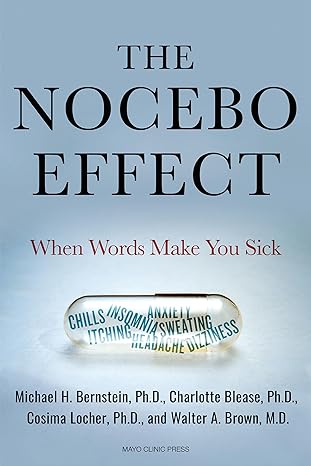The Nocebo Effect: When Words Make You Sick
An investigation of the nocebo effect—the placebo effect’s evil twin.
Can beliefs make you sick? Consider “The June Bug” incident from a US textile factory in the early 1960s. Many employees began to feel dizzy, had an upset stomach, and vomited. Some were even hospitalized. The illness was attributed to a mysterious bug biting workers. However, when the CDC investigated this outbreak, no bugs or any other cause of the illnesses could be identified. Instead, it appears to be an illness caused by the mind — that is, sickness due to expectation.
The June Bug story is one of many striking examples of the nocebo effect, a phenomenon best summarized as the occurrence of a harmful event that stems from expecting it. The nocebo effect plays a role in side effects for some of the most commonly prescribed medications. It provides a lens for understanding how sensationalized media reports that sound alarm about public health might even become a self-fulfilling prophecy. It might even explain the mysterious symptoms associated with Havana Syndrome, during which dozens of US government employees fell ill after reportedly being exposed to an unidentified sound wave in Cuba.
We are just discovering the power behind this effect and how it can be ethically mitigated. Enlightening and startling, The Nocebo Effect is the first book dedicated to investigating this fascinating phenomenon by the foremost experts in the field.
Co-editors
Charlotte Blease, Ph.D., is a philosopher and interdisciplinary health researcher at Digital Psychiatry, Beth Israel Deaconess Medical Center, Harvard Medical School, and Department of Women’s and Children’s Health, Uppsala University, Sweden. She is a former Fulbright Scholar and a winner in 2012 of the UK-wide BBC Radio 3’s New Generation Thinkers Competition. Dr. Blease has written extensively about the ethics of placebo and nocebo effects. Her research has been profiled by international news outlets including The Washington Post, The Guardian, and The Sydney Morning Herald.
Cosima Locher, Ph.D., is a psychologist and researcher at the Department of Consultation-Liaison Psychiatry and Psychosomatic Medicine, University Hospital Zurich, University of Zurich, Switzerland. She is dedicated to studying honest (e.g., “open-label”) placebos. She is published in leading peer-reviewed journals, such as PAIN, the American Journal of Psychiatry, JAMA Psychiatry, and JAMA Pediatrics. Dr. Locher is a co-founder of The Pain Net, an international network of researchers interested in Chronic Primary Pain, including with a special focus on the placebo effect
Walter A. Brown, M.D., is a Clinical Professor Emeritus of Psychiatry and Human Behavior at the Warren Alpert Medical School of Brown University. He has studied the placebo effect for the past 40 years, and is the author of three books, including The Placebo Effect in Clinical Practice.
Popular Coverage
Wellness by Design Podcast
Episode 142: The Nocebo Effect and Chronic Pain with Dr. Cosima Locher, Ph.D.
Time Magazine: Your Doctor’s Words Could Make You Sick
You may feel a sharp pinch, but it will all be over quickly.
New Book Examines the Roots, Implications of the Nocebo Effect and Strategies to Address It
From the introduction to the conclusion, the recently released book by the Mayo Clinic Press, The Nocebo Effect: When Words Make You Sick, is a comprehensive review of… the topic, with chapters written by multidisciplinary experts in this emerging and understudied field
The Nocebo Effect: How We Think Ourselves Sick, According To Psychiatrists
The psychological and biological basis of nocebo effects
Quillette: The Placebo Effect’s Evil Twin
The Nocebo Effect occurs when we experience pain, depression, or illness based on nothing more than negative expectations.
The Broken Brain Podcast
The Nocebo Effect, with Mike Bernstein
Rationale Wellness Podcast
Episode 343: The Nocebo Effect with Charlotte Blease, PhD, and Cosima Locher, PhD

